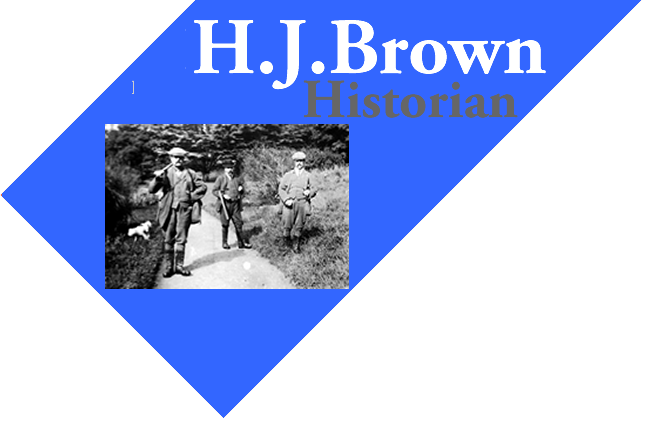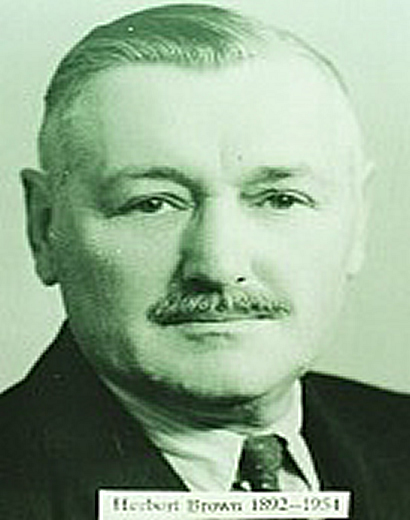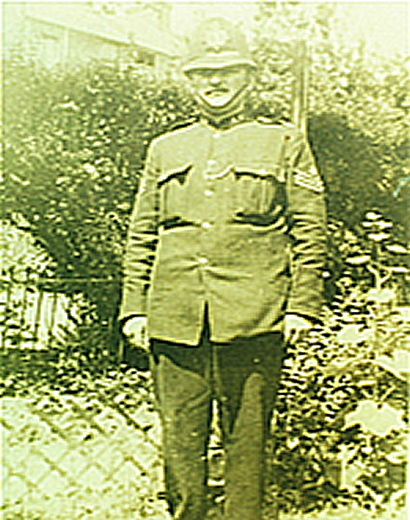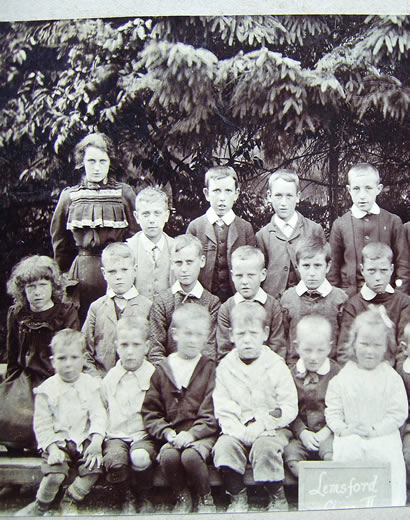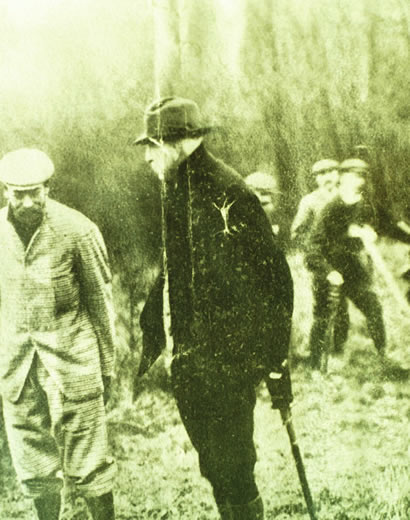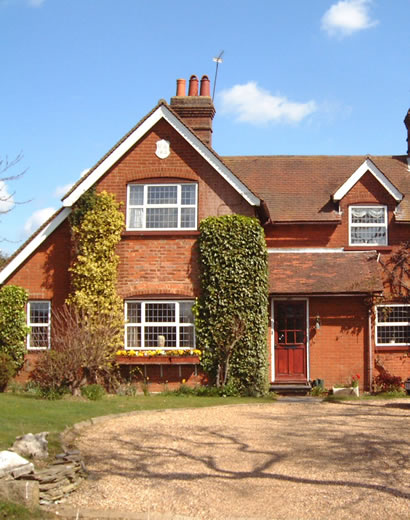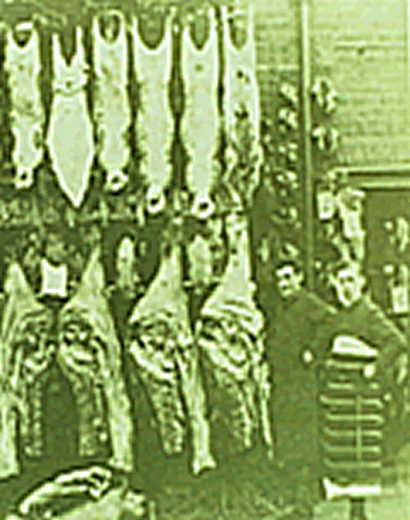Herbert Brown. - 1892 to 1954
My Father, Herbert Brown, was the second son of Alfred and Mary Ann Brown and was born in the left hand cottage that still stands outside the gates of St. Pauls Walden church, Herts. His Father was under gamekeeper on the Earl of Strathmores estate. When Alfred went to work for Lord Mount Stephen at Brocket Park, Lemsford, the family lived in a four roomed cottage (one of a pair) at the end of Cromer Hyde lane.
To enjoy all the Images Click on Large image and the arrow for slide show
Game keepers house 1912 at Cromer HydeThere was no gas, water or sewage but the cottage survived until after the Second World War, when it was demolished. About 1912 the family moved to a brand new house down the lane and this time they had water. This house is still there today although very modernised and no longer a labourers residence.
Lemsford School about 1904. Dad in top row third from the right He spent his schooldays at Lemsford school where he did well but had a reputation of being mischievous. This was probably because he suffered from deafness and didn’t hear authority coming as quickly as the other boys and he was the one who was always caught. Lord and Lady Mount Stephen, who were childless, envied the gamekeepers large family and took interest in it. They arranged for my Dad to go to hospital for an ear operation which was a complete success and in later life he never complained of any ear trouble, only found out about this early problem from my Auntie May who loved to tell stories of the old days. He won at least two prizes for good conduct that I still treasure. When he was old enough he used to help his father at the shoots and was allowed to carry provisions.. It was about this time that the future King George the 5th used to visit Brocket. He was a famous marksman and a picture has survived showing my Father as a boy at a Royal shoot, carrying the provisions in the background.
The future George V and Lord Mount Stephen at one of the shoots , 4th image in slide show. Dad is the boy with the guns at the back.
He left school at 14 and went to work as a farmer’s boy on Handside farm which was where Welwyn Garden City now stands and was owned by a gentleman farmer named Horn. He used to say that one of his jobs at harvest time was to take a pony and trap round with a barrel of beer on it, so that all the men could drink their fill. They never got drunk because they used to sweat it out.
At Stebbens about 1908 second from right He left the farm and went to learn the butchering trade at Stebbens in Fore St , Hatfield, where animals were slaughtered on the premises. He used to deliver meat on a pony and trap and on one occasion the horse stopped in the middle of a ford and he couldn’t get it to budge! His next butchering job was at T. Gurnby ,Randall and Sons, 33 High St.Hampstead. In those days it was a high class area and it was a very high class butcher.
In 1913 he joined the Metropolitan Police and started at the Borough of Southwark, living in the Section house at the station. It must have been a very tough district in those days and young policemen used to patrol with older men to learn the ropes. The pubs did not have closing hours and the publicans used to like beat policemen to call in to see if they wanted anyone turfing out. The best way to do this was to give the policeman a drink when he looked in and in those days policeman could drink a lot of beer.
He did not speak a lot about those early days in the police but I recall him speaking about the horse drawn fire engines. The horses were very high spirited and when the fire bells rang in seemed to make them all excited. When they were pulling the long escape it tended to swerve all over the road, particularly round corners, so when people heard it coming they used to drive carts and cars up onto the pavement to try and get out of the way.
Another incident he spoke about was one night at the Elephant and Castle underground station when a soldier tried to get in the gates of the carriage after they had closed. He got caught up and fell under the train and was killed. Dad was on duty at the crossing above and got the handcart that served as an ambulance and went down with the station staff to pick up the pieces. It had been the last train and as the lift was ascending all the power was cut off and there they were with the corpse and just his Bullseye lantern waiting for the power to come back on. Policemen really used their first aid knowledge then as there was no 999 service to call on and few phones anyway. I still have his bloodstained first aid book.
The handcart was just like a costermongers barrow but it had a canvas hood and restraining straps to hold down anybody who was drunk or worse , and could take casualties to hospital in. I still remember seeing one in the yard at Hornsey Road station when I was a boy but it was rarely used by then.
If there was a street disturbance someone got a message back to the station usually by persuading a passer by to act as a runner. Then depending on the size of the trouble all available policemen would proceed as quickly as possible to the scene. This meant that for off duty men in the section house there was no time to put on all their uniform so sometimes they would be in civvies and just a helmet and truncheon. In any case they would all go running out of the station as quick as they could and it must have been a funny sight----just like the Keystone Cops!
On one occasion when he was on patrol with an older man, a passer by told them that a policeman was being beaten up in a nearby street. They both set off towards the incident but Dad was young and got there first. He found a big drunken docker sitting on top of an insensible policeman, pummelling him. It was the first violent incident he had encountered and he unsuccessfully tried to pull the big docker off. Meanwhile the older man trundled up and told Dad to move over then pulled his truncheon and laid the man out. Immediately he told Dad to quickly take the dockers heavy boots off and then sit on the mans chest. Dad did this and in a few moments when the man came to and lashed out with his feet he only hurt himself. When he sobered up in the cells he bore no malice for his sore head and this was the general pattern of similar incidents at that time when drunkenness was such a terrible problem.
He married my Mother, Emma Adams, who he met at Handside farm and their first home was a flat in Thrush St. ,Southwark. It was there that Mary was born in1917 and I was born in 1924.In 1918 he joined the Army in the Machine Gun Corps and we have his picture in the family album, but the war ended before he went to France and he had to go back into the police.
Hornsey Road garden about 1935 He went to night school to improve his education and in 1928 he was promoted to Sergeant and transferred to Brixton. The family moved to Canterbury Rd. where they had the top floor in a large house. Later in 1932 he was promoted to Station Sergeant and transferred to Holloway. This time they rented a large house at 464 Hornsey Rd. and sub-let the top floor to a steeplejack named Mackney and his family .
Mum was always keen that he should realise his true worth and reach Inspector rank, and at one stage, after pressure from his brother Ernest, he joined the Free Masons who had many members in the Police. He didn’t stay in long , I don’t think it was his cup of tea, and he never got further promotion.
In 1938 he retired after 25 years service, at the age of 46. Mum had always been keen to move out of central London and they purchased a new house at 4 Elmer Close ,Enfield, and moved in on March 5th. !938. His pension was not enough to live on and he took a job with a chain of pubs , looking after the money. This meant him being out late and Mum didn’t like it after all those years of night work and he left and joined the Railway police, and remained there until the War broke out in September 1939.
Like many other police pensioners he went back to the Met at Holloway with his old rank of Station Sergeant. During the Blitz the station got a direct hit on a night when he would normally been on duty, but it was his night off. When he went in the next day he found the station all rubble, the Inspector, his wife and daughter and several men killed or wounded. Later in the war a small sub station was opened in a church off Hornsey Rise and Dad was put in charge until; the end of the war. After the war he joined the Ministry of Fuel as a temp. clerk and had the job of going round the large coal dumps that there were round London to take their temperature to guard against them getting too hot and burning. Later when an Army Record Office opened in the huts that used to belong to the gun site he transferred there still in a temp capacity.
In 1952 he and Mum went for a wonderful holiday to South Africa on a Union Castle boat to visit Mary and Viggo in Capetown, and to see their grand children. The voyage took about two weeks and the facilities aboard ship were fantastic. They had never been abroad before and it made quite an impression on them. When he got home he became ill and after several operations and a long illness which he bravely bore he died in 1954.
My Father was an easy going man who rarely lost his temper. I think he really liked being in the police and was every inch what you expected from an old time bobby. He liked his pipe and a glass of beer and really enjoyed vegetable gardening, probably a throw back to his youth when Grandad grew all the families’ vegetables. He was not a competitive man but did like a game of darts. He looked back with pleasure to the days when he helped his father at game shoots and was always happy to go to Brocket as a beater if he got the chance.
All images and text are owned by H.J.Brown. Permission must be obtained from H.J.Brown to reproduce any of the material on this site. Contact H.J.Brown
